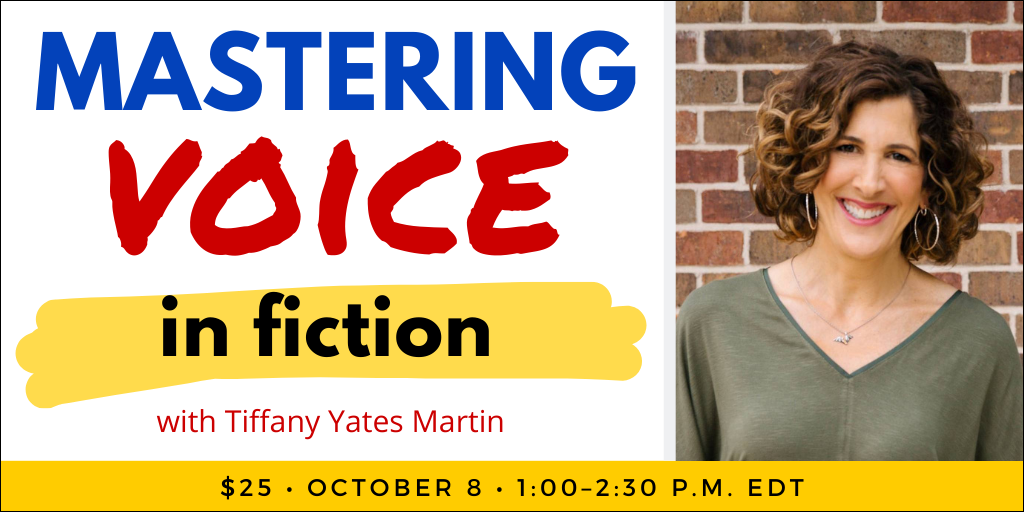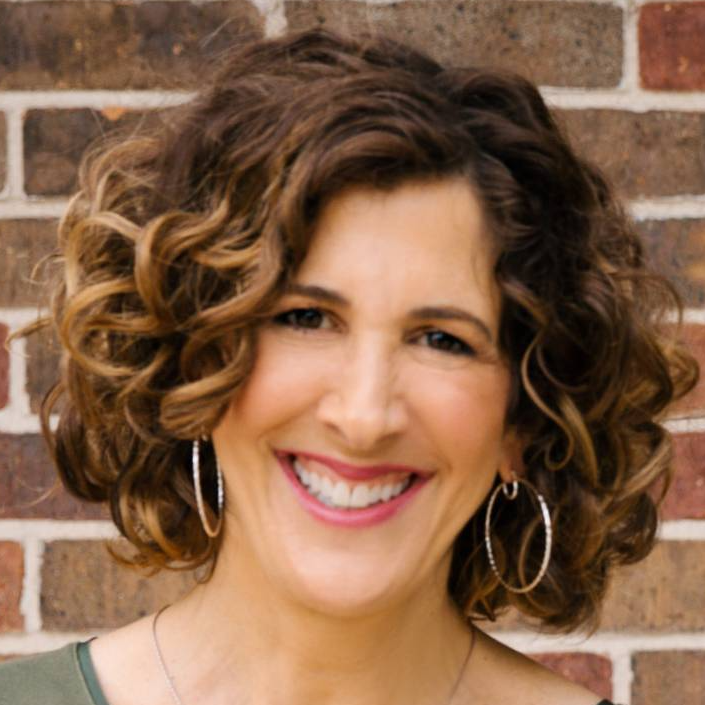
Right now’s submit is by editor Tiffany Yates Martin. Be part of us on Wednesday, October 8, for the web class Mastering Voice in Fiction.
Some of the frequent items of recommendation authors hear from brokers and editors in making their work stand out is that it must have voice: sturdy voice, a novel voice, a compelling voice—and even simply be “voicey.”
Voice is arguably among the many most necessary components in catching the eye of brokers, editors, and readers. As literary agent Amy Collins of Talcott Notch says, “Manuscripts might have crisp, participating dialogue, wonderful descriptive scenes, and an ideal plot… However none of that issues if the tone of the writing is bland or the voice isn’t distinctive.”
That is the place authors might really feel a bit flummoxed. We all know voice issues—enormously—in setting our tales aside in a crowded market. However what the hell is it, and what makes it highly effective or intriguing or distinct? And if it’s too sturdy or distinctive, may it not draw consideration to itself—like Fergie’s rendition of the Nationwide Anthem?
“I perceive why authors wrestle with it,” Collins admits.
What’s voice?
One motive voice is such a difficult idea to understand is that it’s used to refer to 3 completely different components of storytelling: character voice, narrative voice, and writer voice—they usually can typically overlap.
Character voice is the way in which your characters specific themselves and their persona. In direct-POV tales (first individual and deep third), the place the character can also be the narrator, character and narrator voice are primarily the identical.
In oblique POV tales (restricted third and omniscient) the narrative voice is distinct from that of the characters and could also be impartial and practically invisible, or distinctive and even particular. Junot Diaz’s The Transient Wondrous Lifetime of Oscar Wao, as an example, incorporates a narrator who can also be a minor character within the story but takes an omniscient POV with a novel, sturdy voice, as does Marcus Zusak’s The E book Thief, narrated by omniscient, personality-filled Loss of life, additionally a serious participant within the story. [Learn more: Choosing Story Perspective: Direct versus Indirect POV]
And overlaying all of that’s writer voice—maybe essentially the most ephemeral and hard-to-define space of voice. Writer voice is why, although the characters, setting, style, and method could also be completely different in every of an writer’s books, they at all times have a deeply private stamp on them of the writer’s fashion—and it’s so typically why readers repeatedly hunt down a favourite writer’s work.
Writer voice tends to be the trickiest, and the one most authors are grappling with after they really feel confused or baffled by what precisely voice is or means or consists of.
Writer voice encompasses a big selection of components: diction and syntax, phrase alternative and language use, rhythm and tone, body of reference and worldview and themes, and extra. Briefly, it’s the writer’s persona and magnificence infusing itself into the work, typically subtly or with out drawing consideration to itself—although not at all times, as in “metanarrated” tales like William Goldman’s The Princess Bride or Miguel de Cervantes’ Don Quijote de la Mancha, the place the self-esteem is that that the writer (or not less than a fictionalized model of them) is narrating the story immediately.
Confused but?
Discovering your story’s voice
As you’re tackling your tales, a lot of their voice might be a artistic determination you intentionally make within the type of the narrative and character voices. What perspective do you need to inform your story from? What narrative standpoint fits your story and intentions and magnificence? What tone, what method, what degree of intimacy are you imagining?
You might know you need a narrative voice that’s separate from the character voice, as an example—the oblique POVs of omniscient or restricted third—to permit you a broader narrative vantage level from which to look at and report their actions, ideas, and the story motion slightly than the extra subjective and restricted perspective of the characters themselves.
Or maybe the story you think about is firmly planted within the direct perspective of a number of of your primary characters—they converse to you, you hear their voice already because the story performs in your head, and also you need to give readers direct entry to that have as they stay out the occasions of your story, as in the event that they’re on a ride-along.
It’s okay in the event you aren’t sure at first about the best voice to your story. In writing The E book Thief, set in Nazi Germany throughout World Warfare II, writer Marcus Zusak knew early on what narrative perspective he needed: “Loss of life is ever-present throughout struggle, so right here was the proper option to narrate The E book Thief,” he says in an interview behind the e-book.
However at first, he says, Loss of life was too imply, supercilious and creepy, and he didn’t really feel the narrative/character voice was working for the story. He experimented with different approaches, together with altering the POV and narrative perspective, however six months later got here again to Loss of life, this time as a personality existentially wearied of his morbid job and “telling this story to show to himself that people are literally value it,” with a looser, even humorous tone.
Shelby Van Pelt occurred upon a key narrative voice in her first novel as an train in a writing class to jot down from an uncommon standpoint. When she turned in a quick piece written from the POV of an clever, keenly observant, wryly witty octopus, her instructor inspired her to increase the story, and the consequence—Remarkably Vibrant Creatures—grabbed the eye of brokers and publishers with Marcellus the octopus’s distinctive opening narrative/character voice, promoting for six figures in a multi-house public sale and finally touchdown on the New York Occasions bestseller listing not as soon as however twice.
Van Pelt has written and spoken of the way in which Marcellus’s voice got here to life in her head, shaping the narrative, but her multiple-POV story additionally options two different distinctive narrative/character voices, every in a special POV, broadening her narrative perspective past Marcellus’s aquarium tank to permit her extra freedom in telling the total story.
How do you see and listen to a selected story in your head? The place are you “observing” it from? How would you like your readers to expertise it? What tone and perspective feels most pure and comfy to you?
Alternatively, what is likely to be an intriguing or rewarding narrative voice to attempt to stretch you past that consolation zone?
Your story as you’re imagining it could counsel the type of sturdy, particular narrative voice Zusak and Van Pelt settled on, or you may want a extra goal perspective, like Laurie Frankel’s This Is How It At all times Is, a narrative advised in a extra impartial omniscient narrative voice that doesn’t draw consideration to itself, however permits readers entry to every character’s ideas, reactions, and feelings and give attention to the experiences, individually and collectively, of a household with a transgender little one.
Narrative voice helps set a narrative’s tone, really feel, temper. It directs the reader’s expertise of the story via creating its scale and scope, how a lot entry the reader has to the character, and what perspective they’re viewing and experiencing it from. It may possibly decide whether or not your story feels informal or extra formal, intimate or extra eliminated, goal or subjective.
Like so many questions in craft, there is no such thing as a “proper” reply to which narrative voice is finest for a selected story. It’s purely subjective, primarily based on many private and stylistic components. All POVs and views are probably marketable (even Loss of life, as Zuzak proved). Current tense is as standard as previous, and neither one is healthier nor worse, simply completely different.
The “proper” narrative voice is the one which feels proper to you for the story you need to inform, the way in which you need to inform it, and the expertise you need the reader to have.
Discovering your voice
However the place does your writer voice come into the combination? In the event you’ve chosen a selected narrative/character voice to your story for the impact it creates on readers, then isn’t “including in” your personal private artistic voice a distraction?
Like the reply to most artistic questions, it relies upon.
Zusak talks about reconsidering and sharpening his prose “dozens of instances” in his writing and revision course of and over lengthy stretches of time, significantly his distinctive use of figurative language: “I like the concept each web page can have a gem on it,” he says.
Choose up any of his writing and also you’ll start to note consistencies, even throughout very completely different tales: that use of highly effective imagery and figurative language, darkish themes and the exploration of huge philosophical questions with a hopeful bent, and humor typically laced all through. He typically addresses the reader as if bringing us into the characters’ confidence, and alternates quick-moving brief sentences and paragraphs with longer and extra introspective prose in tales of characters looking for that means.
As with most expert storytellers, Zusak’s authorial voice is distinctive in all his work, and but it doesn’t pull focus from or outline the story itself. It runs beneath the floor of the story like a bass line: Take it out and also you’d discover that the story loses a lot of its richness and texture and depth, however whereas it’s enjoying chances are you’ll by no means even discover it.
Which sounds nice, however how do you do it?
The tone and magnificence and really feel of our tales, nonetheless intentionally crafted, isn’t one thing we fabricate from complete fabric. You’ll by no means discover your personal highly effective genuine voice by copying different folks or imposing a crafted voice onto the writing externally; it comes from inside. Voice is hampered and might really feel unnatural once you attempt to “do it.” Deliberately striving for a voice typically leads to sounding like an imitation of another person, or stiff and self-conscious, and even pretentious.
Writer voice is one thing you already possess, as does each human on earth. The trick is to find, develop, and free it on the web page.
See in the event you can determine the traits of your personal writing in the identical method you’d analyze different authors’ voice. Do you’ve gotten recurring themes in your work? What tone do your tales are likely to have—gentle and humorous? deep and lyrical? informal and intimate or extra formal? optimistic or cynical? or any of a spectrum of infinite prospects. What sort of language do you have a tendency to make use of: your vocabulary and phrase alternative, the rhythm and size of your sentences, the way you form the prose with syntax? Are your tales extra action-focused or introspective and character-driven?
My tales, as an example (written beneath my pen title, Phoebe Fox), are likely to discover the matters of household and forgiveness. They are typically character-driven, have an accessible and casual tone, and incorporate humor. In each my fiction and nonfiction writing, I typically write in advanced sentences with compound clauses and loads of em dashes and semicolons; I like language and am deliberate with phrase alternative, am fairly free with imagery and figurative language, and infrequently incorporate alliteration in addition to rhythms of three (as in actual fact this sentence does).
In the event you can’t pinpoint your personal authorial voice, ask others to give you their goal perspective. Ask beta readers, critique companions, or actually anybody prepared to learn you to characterize the tone and really feel of your voice, your fashion, the persona of your writing.
Write a particular excerpt of one other writer’s story in your personal method—how would you relate that passage? Then write an excerpt from your personal tales within the fashion of one other writer—an effective way to determine precisely the way it’s completely different from what you naturally gravitate to. Do this train with one other writer: Have them write one thing in what they really feel is your voice, whilst you do the identical for his or her work—it’s a sensible, hands-on option to determine the parts of voice and see what makes every writer’s distinctive.
Your voice could also be influenced by different artists’ voices—we’re all formed by our surroundings, together with who and what we like to learn. The trick is to let these influences all marinate and result in your personal distinctive concoction, as choreographer Camille A. Brown talks about in her TED Speak. Her voice takes inspiration and affect from every part from the Jacksons to Broadway musicals to African American social dance. In choreographing her manufacturing of As soon as on This Island, Brown reached out to an professional in Afro-Haitian dance, however then used it as a jumping-off level for her personal creation. “That is about me understanding the origins for myself. So then I can use my choreographic voice and riff on that,” she says. “After which when it comes out, it’s one thing that’s Camille and never another person’s.”
Every of us comprises multitudes, and you may faucet into completely different elements of your writer voice from story to story, simply as we entry completely different elements of our persona in varied social teams. And your writer voice might evolve as you deepen your understanding of craft and as you develop as an individual.
Last ideas
As Amy Collins says, “Authors have to determine and lean into their voice in order that their scenes and chapters will not be impartial and beige. The authors might have distinctive backstory or twists, but when the voice is null or bland, then I’m out.”
Voice takes braveness and confidence and observe. Belief that you’re sufficient—your genuine self. It is probably not Hemingway or King or Saunders or whoever you admire, however we have already got that. What the world doesn’t have is you and your distinctive, singular, distinctive voice.

Word from Jane: In the event you loved this submit, make sure you be a part of us on Wednesday, October 8, for the web class Mastering Voice in Fiction.

Tiffany Yates Martin has spent her complete profession as an editor within the publishing business, working with main publishers and New York Occasions, Washington Publish, Wall Road Journal, and USA Right now bestselling and award-winning authors in addition to indie and newer writers. She is the founding father of FoxPrint Editorial (named one in all Author’s Digest’s Finest Web sites for Authors) and writer of Intuitive Enhancing: A Artistic and Sensible Information to Revising Your Writing and her newest, The Intuitive Writer: Develop & Maintain a Happier Writing Profession. She is a daily contributor to writers’ retailers like Author’s Digest, Jane Friedman, and Author Unboxed, and a frequent presenter and keynote speaker for writers’ organizations across the nation. Below her pen title, Phoebe Fox, she is the writer of six novels.


Leave a Reply